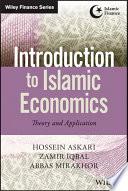
Critical Issues and Challenges in Islamic Economics and Finance Development
This book explores contemporary issues and trends facing Islamic banks, businesses and economies as presented at the International Conference of Islamic Economics, Banking and Finance. The authors leverage current empirical research and statistics to provide unique and fresh perspectives on the changing world of Islamic finance. They focus specifically on to the implementation of Islamic financial instruments and services in global capital markets and how their success can be evaluated. Chapters feature case studies from all over the world including examples from Afghanistan, Bosnia and Herzegovina and the United Kingdom, to name a few. The breadth and immediacy of the research presented by the authors will appeal to practitioners and scholars alike. The global outlook and rich data-based approach adopted in this book guarantee that it is a timely and valuable addition to the field of Islamic finance.
- ISBN 13 : 3319450298
- ISBN 10 : 9783319450292
- Judul : Critical Issues and Challenges in Islamic Economics and Finance Development
- Pengarang : Velid Efendić, Fikret Hadžić, Hylmun Izhar, Fikret Hadžić, Hylmun Izhar, Fikret Hadžić, Hylmun Izhar, Fikret Hadžić, Hylmun Izhar,
- Kategori : Business & Economics
- Penerbit : Springer
- Bahasa : en
- Tahun : 2017
- Halaman : 236
- Google Book : https://play.google.com/store/books/details?id=SqjNDgAAQBAJ&source=gbs_api
-
Ketersediaan :
This book explores contemporary issues and trends facing Islamic banks, businesses and economies as presented at the International Conference of Islamic Economics, Banking and Finance.








